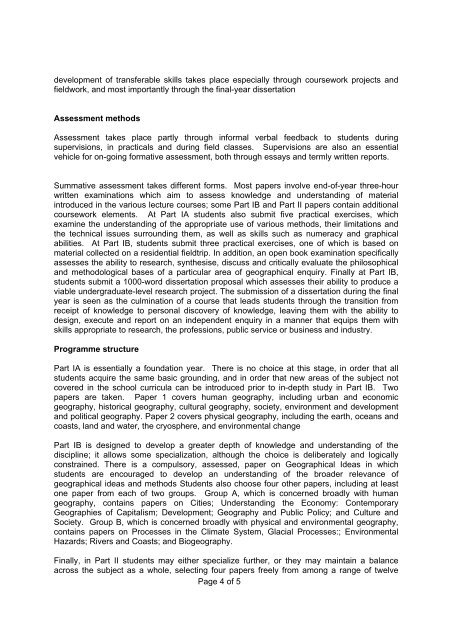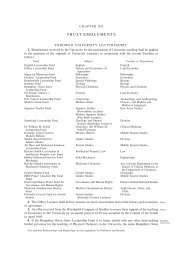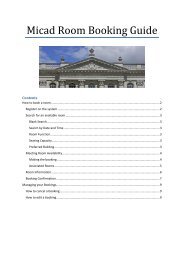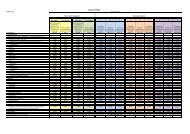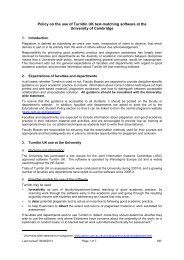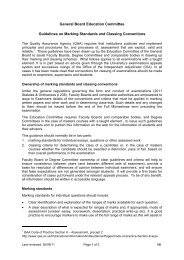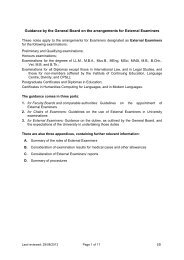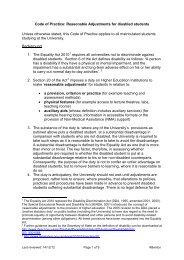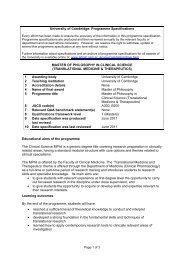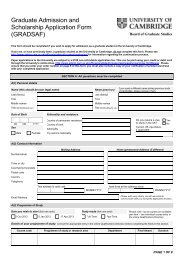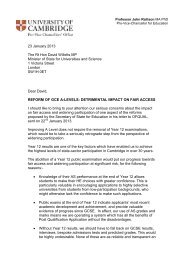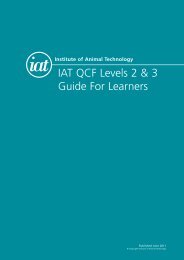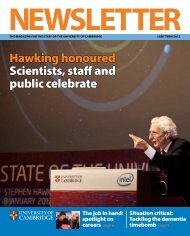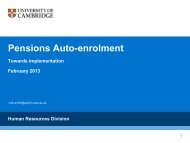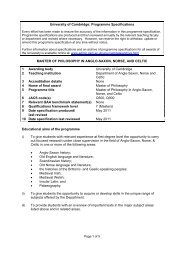Geographical Tripos - University of Cambridge
Geographical Tripos - University of Cambridge
Geographical Tripos - University of Cambridge
Create successful ePaper yourself
Turn your PDF publications into a flip-book with our unique Google optimized e-Paper software.
development <strong>of</strong> transferable skills takes place especially through coursework projects and<br />
fieldwork, and most importantly through the final-year dissertation<br />
Assessment methods<br />
Assessment takes place partly through informal verbal feedback to students during<br />
supervisions, in practicals and during field classes. Supervisions are also an essential<br />
vehicle for on-going formative assessment, both through essays and termly written reports.<br />
Summative assessment takes different forms. Most papers involve end-<strong>of</strong>-year three-hour<br />
written examinations which aim to assess knowledge and understanding <strong>of</strong> material<br />
introduced in the various lecture courses; some Part IB and Part II papers contain additional<br />
coursework elements. At Part IA students also submit five practical exercises, which<br />
examine the understanding <strong>of</strong> the appropriate use <strong>of</strong> various methods, their limitations and<br />
the technical issues surrounding them, as well as skills such as numeracy and graphical<br />
abilities. At Part IB, students submit three practical exercises, one <strong>of</strong> which is based on<br />
material collected on a residential fieldtrip. In addition, an open book examination specifically<br />
assesses the ability to research, synthesise, discuss and critically evaluate the philosophical<br />
and methodological bases <strong>of</strong> a particular area <strong>of</strong> geographical enquiry. Finally at Part IB,<br />
students submit a 1000-word dissertation proposal which assesses their ability to produce a<br />
viable undergraduate-level research project. The submission <strong>of</strong> a dissertation during the final<br />
year is seen as the culmination <strong>of</strong> a course that leads students through the transition from<br />
receipt <strong>of</strong> knowledge to personal discovery <strong>of</strong> knowledge, leaving them with the ability to<br />
design, execute and report on an independent enquiry in a manner that equips them with<br />
skills appropriate to research, the pr<strong>of</strong>essions, public service or business and industry.<br />
Programme structure<br />
Part IA is essentially a foundation year. There is no choice at this stage, in order that all<br />
students acquire the same basic grounding, and in order that new areas <strong>of</strong> the subject not<br />
covered in the school curricula can be introduced prior to in-depth study in Part IB. Two<br />
papers are taken. Paper 1 covers human geography, including urban and economic<br />
geography, historical geography, cultural geography, society, environment and development<br />
and political geography. Paper 2 covers physical geography, including the earth, oceans and<br />
coasts, land and water, the cryosphere, and environmental change<br />
Part IB is designed to develop a greater depth <strong>of</strong> knowledge and understanding <strong>of</strong> the<br />
discipline; it allows some specialization, although the choice is deliberately and logically<br />
constrained. There is a compulsory, assessed, paper on <strong>Geographical</strong> Ideas in which<br />
students are encouraged to develop an understanding <strong>of</strong> the broader relevance <strong>of</strong><br />
geographical ideas and methods Students also choose four other papers, including at least<br />
one paper from each <strong>of</strong> two groups. Group A, which is concerned broadly with human<br />
geography, contains papers on Cities; Understanding the Economy: Contemporary<br />
Geographies <strong>of</strong> Capitalism; Development; Geography and Public Policy; and Culture and<br />
Society. Group B, which is concerned broadly with physical and environmental geography,<br />
contains papers on Processes in the Climate System, Glacial Processes:; Environmental<br />
Hazards; Rivers and Coasts; and Biogeography.<br />
Finally, in Part II students may either specialize further, or they may maintain a balance<br />
across the subject as a whole, selecting four papers freely from among a range <strong>of</strong> twelve<br />
Page 4 <strong>of</strong> 5


